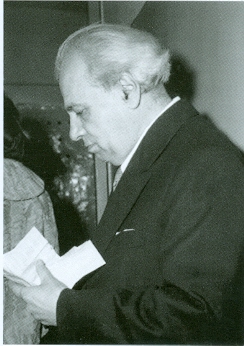Biography of Vito Levi
Vito Levi was a musician and composer as well as former lecturer at the University of Trieste and local Conservatory and the author of critical and authorial texts.
Born in Trieste in 1899, he first approached music through the study of the violin under the guidance of Lionello Morpurgo, taking part in the musical performances of the “Svevo lounge” of Villa Veneziani from a very young age. He later moved towards the study of composition.
At the end of the First World War, composer Antonio Smareglia moved to Trieste and Vito Levi, one of his students, perfected is composition training, presenting the symphonic poem “Il Carso” as a first performance at the end of his studies, in 1921.
In 1923, Levi took on the role of teacher of composition at the Trieste music secondary school and thereafter collaborated as musical critic with “Il Piccolo”, which he had joined in 1926.
With the issue of the racial laws in 1938, Levi was removed from office, and it was only thanks to private lessons and translations of opera librettos from German, under the pseudonym of Bruno Bruni, that he managed to overcome his financial difficulties. After 8 September 1943, following the city’s Nazi occupation, he was forced to hide in Venice, to escape the deportation that was to decimate the many Jewish communities in Trieste.
With the war over, he returned to his birthplace and in 1945 resumed his position as teacher at the music secondary school and then with the “G. Tartini” state conservatory, teaching history of music and composition. From 1946 to 1969, he taught history of music at the Faculty of Humanities and Philosophy of the University of Trieste. He also collaborated as musical critic with the new newspaper entitled “La voce libera” and with Radio Trieste - later to become RAI’s regional base - with cycles of lessons on the history of music and informative conversations.
He was an authoritative presence at the “Città di Trieste” music prize and the choral singing contest “C.A. Seghizzi” of Gorizia, which he then chaired. He held conferences and promoted cultural initiatives for the Club of Culture and Arts and the Concerts Society of Trieste.
He enjoyed many friendships with Italian and foreign musicians and musicologists, as well as with writers and cultured men of Trieste, including Italo Svevo, Umberto Saba - with whom he shared a passion for books - Silvio Benco, Renzo Rosso and Fulvio Tomizza, who was both his son-in-law and a dear friend.
In acknowledgement of such passionate commitment to spreading a musical culture in all its forms, in 1981 the University of Trieste awarded him an honorary degree in humanities.
Vito Levi died in Trieste in 2002 over a hundred years old.
Selected works
Oceana di Antonio Smareglia. Piccola guida attraverso l’opera, Trieste, 1949
Nozze istriane nel centenario della nascita di Antonio Smareglia (18S4-19S4), Trieste, 1954
Tristano e Isotta di Riccardo Wagner, Venezia 1958
La vita musicale a Trieste. Cronache di un cinquantennio (1918-1968), Milano 1968
Richard Strauss, Pordenone, 1984
Quando le parole finiscono. Note per i programmi di sala della Società dei Concerti di Trieste scelte da Bianca Zanettovich, premessa di Gianni Gori, Trieste 1995
Antologia degli scritti musicali con una nota biografica, a cura di Giuseppe Radole, Udine 1999
Frammenti di un diario musicale (1919-1979), a cura di Fabio Venturin, Trieste 2012
Conversazioni e dialoghi musicali. Radio Trieste 1945-1954, a cura di Fabio Venturin, Trieste 2016
Selected bibliographical sources
De Ferra G., Vito Levi: il compositore, critico, saggista, insegnante al Conservatorio e docente universitario, Trieste 1970
AA.VV., La musica, la vita del suo tempo e oltre il suo tempo: l'insegnamento di Vito Levi (1899-2002), protagonista, scrittore, testimone della storia e della vita musicale: Mostra documentaria 20 dicembre 2019 -31 gennaio 2020, Trieste 2019
External Link
Publications
Vito Levi, Conversazioni e dialoghi musicali Radio Trieste 1945-1954

